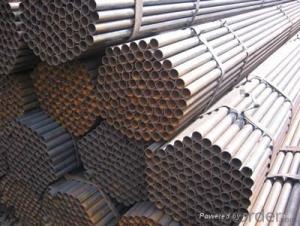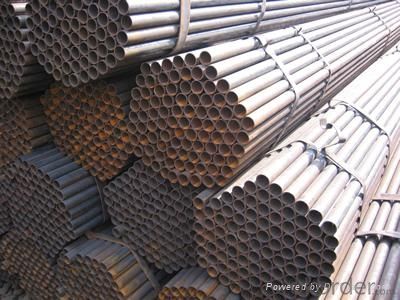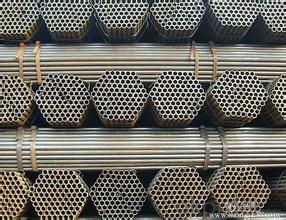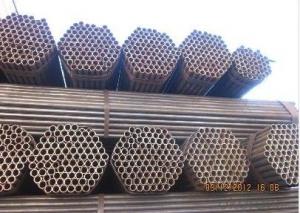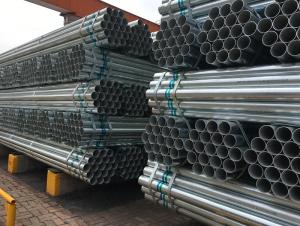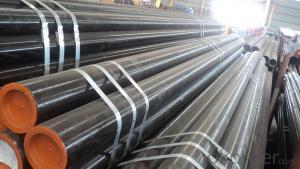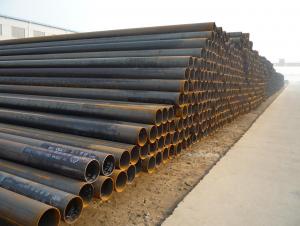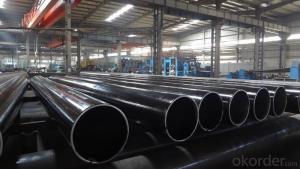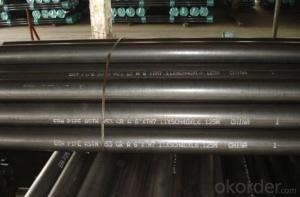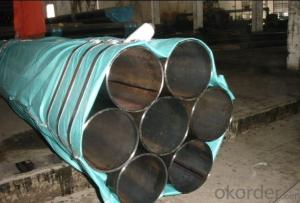Steel Pipe Welded Black ERW Steel Pipe 5L
- Loading Port:
- China main port
- Payment Terms:
- TT OR LC
- Min Order Qty:
- 25 m.t.
- Supply Capability:
- 7500 m.t./month
OKorder Service Pledge
OKorder Financial Service
You Might Also Like
1、Structure of Welded Black ERW Steel Pipe 5L 5 CT :
Welded Black ERW Steel Pipe 5L 5 CT is electric resistance welding, the abbreviation for ERW for transporting oil and natural gas vapor liquid objects, can meet the requirements of high and low pressure, the transport in the world with pipe sector accounted for a pivotal position.With sound reputation and high quality , we will offer clients a wonderful business experience.
2、Main Features of Welded Black ERW Steel Pipe 5L 5 CT :
• High manufacturing accuracy
• High strength
• Good visual effect
• Good view and appearance
• Good shape
• Reasonable price
• Small inertia resistance
• Strong heat dissipation ability
3、Welded Black ERW Steel Pipe 5L 5 CT Specification:
Standard | GB, DIN, ASTM ASTM A106-2006, ASTM A53-2007 |
Grade | 10#-45#, 16Mn 10#, 20#, 45#, 16Mn |
Thickness | 1 - 33 mm |
Section Shape | Round |
Outer Diameter | 21 - 610mm |
Place of Origin | Tianjin, China (Mainland) |
Secondary Or Not | Non-secondary |
Application | Hydraulic Pipe |
Technique | Cold Drawn |
Certification | API |
Surface Treatment | factory state or painted black |
Special Pipe | API Pipe |
Alloy Or Not | Non-alloy |
Length | 5-12M |
Outer Diameter | 21.3-610mm |
Grade | 20#, 45#, Q345, API J55, API K55, API L80, API N80, API P110, A53B |
Standard | ASME, ASTM |
1) Material:20#(ASTM A 106/A53 GRB.API5LGRB,GB),45#,16Mn,10#.
2) Specification range:OD:21.3-610mm,WT:6-70mm,length:6-12m or according to the requirement of clients.
3) Excutive standards:GB,ASME API5L.ASTM A 106/A53,Despite of the above standards,we can also supply seamless steel pipe with standard of DIN,JIS,and so on,and also develop new products according to the requirements of our clients!
4) Surface:black lacquered,varnish coating or galvanized.
5) Ends:Beveled or square cut,plastic capped,painted.
6) Packing:bundles wrapped with strong steel strip,seaworthy packing.
4、Packaging & Delivery
Packaging Details: | seaworthy package,bundles wrapped with strong steel strip |
Delivery Detail: | 15-30days after received 30%TT |
5、FAQ of Welded Black ERW Steel Pipe 5L 5 CT :
①How is the quality of your products?
Our products are manufactured strictly according to national and internaional standard, and we take a test
on every pipe before delivered out. If you want see our quality certifications and all kinds of testing report, please just ask us for it.
Guaranteed: If products’ quality don’t accord to discription as we give or the promise before you place order, we promise 100% refund.
②How about price?
Yes, we are factory and be able to give you lowest price below market one, and we have a policy that “ for saving time and absolutely honest business attitude, we quote as lowest as possible for any customer, and discount can be given according to quantity”,if you like bargain and factory price is not low enough as you think, just don’t waste your time.Please trust the quotation we would give you, it is professional one.
③Why should you chose us?
Chose happens because of quality, then price, We can give you both.Additionally, we can also offer professional products inquiry, products knowledge train(for agents), smooth goods delivery, exellent customer solution proposals.Our service formula: good quality+good price+good service=customer’s trust
SGS test is available, customer inspection before shipping is welcome, third party inspection is no problem.
6、 Welded Black ERW Steel Pipe 5L 5 CT Images:
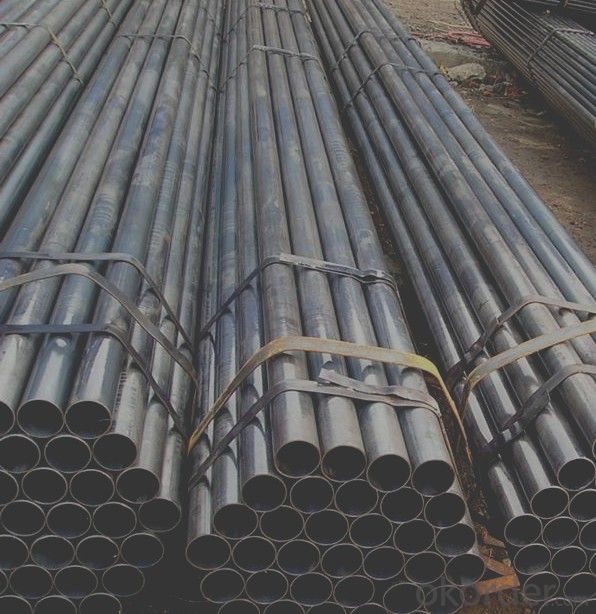
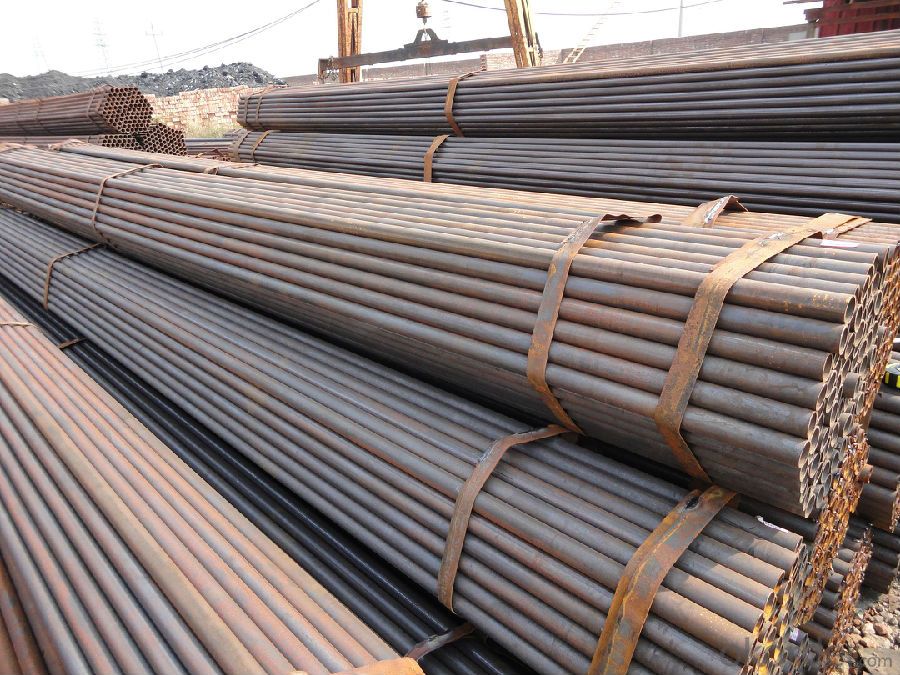
- Q: What is the role of steel pipes in the telecommunications industry?
- Steel pipes play a crucial role in the telecommunications industry as they are used for the installation of underground and overhead telecommunication cables. These pipes provide protection and support to the cables, ensuring their safety and longevity. Additionally, steel pipes are also used in the construction of communication towers and infrastructure, making them an essential component in establishing and maintaining reliable telecommunications networks.
- Q: How much is 4 inches steel tube MM?
- 1 inches =25.4 mm;4 inches =101.6 mm;The specification of steel pipe is usually nominal size;
- Q: What are the different methods of joining steel pipes for high-pressure applications?
- The different methods of joining steel pipes for high-pressure applications include welding, threaded connections, flanged connections, and grooved connections. Welding involves fusing the ends of the pipes together using heat, creating a strong and leak-proof joint. Threaded connections involve screwing the pipes together, using threads on the ends of the pipes and pipe fittings. Flanged connections involve using flanges, which are flat, circular discs with bolt holes, to connect the pipes together. Grooved connections involve using grooved couplings that grip the ends of the pipes and are secured with bolts, creating a reliable and easy-to-install joint.
- Q: What are the dimensions of a standard steel pipe?
- The dimensions of a standard steel pipe can vary, but commonly, they range from 1/8 inch to 72 inches in diameter and have a standard length of 21 feet.
- Q: What are the advantages of using steel pipes in plumbing systems?
- There are several advantages of using steel pipes in plumbing systems. Firstly, steel pipes are highly durable and have a long lifespan, making them a reliable choice for plumbing installations. They are resistant to corrosion, rust, and other forms of damage, ensuring the integrity of the plumbing system over time. Additionally, steel pipes have a high tensile strength, allowing them to withstand high pressure and heavy loads without deformation or leakage. They also have excellent heat resistance, making them suitable for hot water and steam applications. Lastly, steel pipes offer a smooth inner surface, minimizing friction and maintaining a consistent flow rate, which is crucial for efficient water distribution and drainage in plumbing systems.
- Q: Are steel pipes suitable for high-temperature applications?
- Yes, steel pipes are suitable for high-temperature applications. Steel has excellent thermal conductivity and can withstand high temperatures without losing its structural integrity. Additionally, steel pipes have high tensile strength and can resist thermal expansion and contraction, making them ideal for transporting hot liquids or gases in industrial processes.
- Q: How can steel pipes be protected from corrosion?
- Steel pipes can be protected from corrosion through various methods. One common method is the application of protective coatings. These coatings act as a barrier between the steel and corrosive elements in the environment. The most widely used protective coating for steel pipes is epoxy, which provides excellent resistance to corrosion. Other coatings such as polyethylene and polyurethane can also be used depending on the specific application and requirements. Another effective way to protect steel pipes from corrosion is by cathodic protection. This technique involves the use of sacrificial anodes or impressed current systems to prevent corrosion. Sacrificial anodes, typically made of zinc or aluminum, are attached to the steel pipes. These anodes corrode instead of the steel, sacrificing themselves to protect the pipes. Impressed current systems, on the other hand, use a direct electrical current to counteract the corrosion process. Regular maintenance and inspection are crucial in the protection of steel pipes from corrosion. Monitoring the condition of the coatings, checking for any signs of damage or deterioration, and promptly addressing any issues can help prevent corrosion from occurring or spreading. Additionally, implementing proper drainage systems to avoid the accumulation of moisture around the pipes can further protect them from corrosion. Lastly, environmental factors should be taken into consideration when protecting steel pipes from corrosion. This includes mitigating exposure to corrosive substances, such as acids or chemicals, and ensuring proper ventilation and airflow to prevent the buildup of moisture and humidity. By implementing a combination of these protective measures, steel pipes can have an extended lifespan and maintain their structural integrity.
- Q: Can steel pipes be used for the construction of tunnels?
- Yes, steel pipes can be used for the construction of tunnels. Steel pipes are often used as support structures in tunnel construction due to their strength, durability, and ability to withstand high pressures. They can be used for various purposes such as drainage, ventilation, or as part of the tunnel structure itself. Additionally, steel pipes can be easily manufactured, transported, and installed, making them a popular choice in tunnel construction projects.
- Q: How do you prevent steel pipes from freezing?
- To avoid freezing of steel pipes, there are several actions that can be taken: 1. Insulate the pipes: Utilize foam insulation sleeves or wrap the pipes with insulation tape. This will help maintain the temperature of the pipes and prevent freezing. 2. Seal any gaps or cracks: Examine the area surrounding the pipes and seal any gaps or cracks using caulk or expanding foam. This will prevent cold air from entering and causing freezing. 3. Install heat cables: Wrap heat cables around the steel pipes to provide a constant source of warmth. These cables can be controlled by a thermostat, ensuring that the pipes remain above freezing temperature. 4. Maintain above-freezing temperature: In regions with severe cold weather, it is recommended to keep the indoor temperature above freezing, even if the property is unoccupied. This will help maintain a suitable temperature for the pipes and prevent freezing. 5. Open cabinets and faucets: During extremely cold weather, open cabinet doors in kitchens and bathrooms to allow warm air to circulate around the pipes. Additionally, allowing faucets to drip slightly can keep water flowing and prevent freezing. 6. Drain the pipes: If the property will be vacant during freezing weather, it is advisable to completely drain the pipes. This can be achieved by shutting off the main water supply and opening all faucets until no water remains. This minimizes the risk of freezing and potential damage. Remember, taking preventive measures is vital in safeguarding steel pipes against freezing. By implementing these actions, you can significantly reduce the chances of frozen pipes and costly repairs.
- Q: What is the difference between steel pipe and aluminum pipe?
- The main difference between steel pipe and aluminum pipe lies in their composition and properties. Steel pipe is made primarily of iron and carbon, with other elements added to enhance its strength and durability. It is known for its high tensile strength, resistance to corrosion, and ability to withstand high temperatures and pressure. On the other hand, aluminum pipe is made from aluminum, which is a lightweight metal known for its excellent corrosion resistance, thermal conductivity, and malleability. While steel pipe is generally stronger and more rigid, aluminum pipe is lighter and more easily manipulated. Additionally, steel pipe is often used in applications where strength and durability are critical, such as in construction and plumbing, while aluminum pipe is commonly used in industries that require lightweight materials, such as aerospace and automotive.
Send your message to us
Steel Pipe Welded Black ERW Steel Pipe 5L
- Loading Port:
- China main port
- Payment Terms:
- TT OR LC
- Min Order Qty:
- 25 m.t.
- Supply Capability:
- 7500 m.t./month
OKorder Service Pledge
OKorder Financial Service
Similar products
Hot products
Hot Searches
Related keywords
